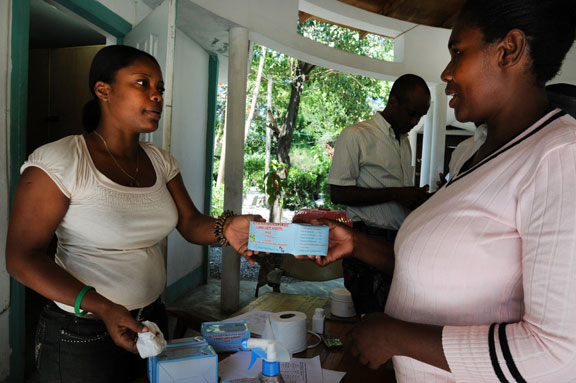 8 December 2010 last updated at 10:48 ET Share this page the cholera epidemic has prompted protests against the UN in Haiti
8 December 2010 last updated at 10:48 ET Share this page the cholera epidemic has prompted protests against the UN in Haiti
None of Nepal's soldiers serving with UN peacekeepers in Haiti was tested for cholera before they went, the Nepalese army's chief medical officer says.
Brig Gen Dr Kishore Rana told the BBC the UN did not require such a test unless a soldier had cholera symptoms.
Earlier on Wednesday, a Nepalese army spokesman rejected a report suggesting the Haiti epidemic had originated from its soldiers.
Cholera has killed more than 2,000 Haitians, prompting anti-UN protests.
Brig Gen Rana contradicted previous statements by the Nepalese army which has maintained that all its troops were given a thorough medical test – including being tested for cholera – before being deployed to Haiti in October.
He said that UN protocol had been followed during the pre-deployment medical, but that none of the troops exhibited symptoms of cholera – so no follow-up tests were done.
His comments come after the leaking of a report by a French disease expert which suggested UN peacekeepers were the most likely source of the cholera epidemic sweeping Haiti.
‘Hypothetical’
Sources who saw the report by epidemiologist Renaud Piarroux said it had evidence the outbreak was caused by river contamination from Nepalese troops.
The report was rejected by army spokesman Ramindra Chhetri on Wednesday.
"We strongly condemn the making of such allegations with no firm evidence or facts," the AFP news agency quoted him as saying.
He said the report's conclusions were "hypothetical" and said the Nepalese base in Haiti had been tested three times and no cholera had been found.
The cholera epidemic has killed 2,120 people, and nearly 100,000 cases have been treated, according to the Haitian government.
The report by Mr Piarroux found that the source of the outbreak was a Nepalese peacekeeping base, whose toilets contaminated the Artibonite river, media reports on Tuesday said.
The river was the main focus of the outbreak when it began in October, but cholera has since spread throughout the country.
The UN mission in Haiti, Minustah, said there was "no conclusive evidence" that UN peacekeepers were the source of the epidemic.
Minustah said the report by the French expert was "one report among many", but it was taking it "very seriously".
Many Haitians have blamed the Nepalese peacekeepers for bringing cholera to the country, and there have been violent demonstrations against them.
‘Not local’
The strain of cholera had already been matched to one from South Asia, although it is present in other Latin American countries.
Cholera is endemic in Nepal; last year, the disease killed more than 300 people in the far west of the country and this September, there was an outbreak in the capital Kathmandu.
Medical experts say it is possible to carry the disease without exhibiting symptoms.
In an interview last week, Mr Piarroux said it was clear cholera had been introduced to Haiti, which had not seen an outbreak of the disease for more than a century.
"It started in the centre of the country, not by the sea, nor in the refugee camps. the epidemic can't be of local origin. That's to say, it was imported," he told AFP.
UN peacekeepers have been in Haiti since 2004 to help restore political stability after years of unrest.
They have also been helping relief efforts following last January's massive earthquake, which killed about 230,000 people.